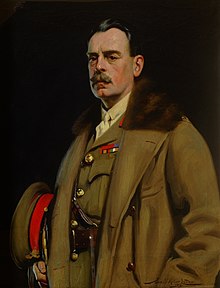Philip Walhouse Chetwode, 1st Baron Chetwode
| The Lord Chetwode | |
|---|---|

A 1919 portrait of Philip Chetwode by John St Helier Lander.
|
|
| Born | 21 September 1869 Westminster, England |
| Died | 6 July 1950 (aged 80) Marylebone, England |
| Allegiance | United Kingdom |
| Service/branch | British Army |
| Years of service | 1889–1935 |
| Rank | Field Marshal |
| Unit |
Oxfordshire and Buckinghamshire Light Infantry 19th Royal Hussars |
| Commands held |
19th Royal Hussars London Mounted Brigade 5th Cavalry Brigade 2nd Cavalry Division Desert Mounted Corps XX Corps Aldershot Command Commander-in-Chief, India |
| Battles/wars | |
| Awards |
Knight Grand Cross of the Order of the Bath Member of the Order of Merit Knight Grand Cross of the Order of the Star of India Knight Commander of the Order of St Michael and St George Distinguished Service Order |
| Other work |
Constable of the Tower President of the Royal Geographical Society |
Field Marshal Philip Walhouse Chetwode, 1st Baron Chetwode, 7th Baronet of Oakley, GCB, OM, GCSI, KCMG, DSO (21 September 1869 – 6 July 1950) was a senior British Army officer. He saw action during the Second Boer War, during which he was present at the Siege of Ladysmith in December 1899. He saw action again during World War I on the Western Front, taking part in the First Battle of Ypres, and then in the Sinai and Palestine Campaign during which he led his corps at the First Battle of Gaza in March 1917, at the Battle of Beersheba in October 1917 and the Battle of Jerusalem in November 1917.
After the War he held a series of senior military appointments including Adjutant-General to the Forces and then Commander in Chief Aldershot Command. He went on to be Chief of the General Staff in India in 1928 and Commander in Chief in India in 1930 and was much concerned with the modernisation and "Indianisation" of the army in India.
...
Wikipedia
